Wolf (1994)
Directed by: Mike Nichols
Written by: Jim Harrison, Wesley Strick
Starring: Jack Nicholson, James Spader, Kate Nelligan, Michelle Pfeiffer
USA
AVAILABLE ON BLU-RAY, DVD and DIGITAL
RUNNING TIME: 125 mins
REVIEWED BY: Dr Lenera
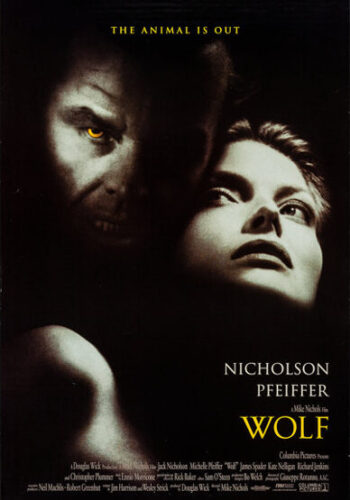
Aging, run down editor-in-chief of a publishing house Will Randall gets demoted when it gets taken over by tycoon Raymond Alden, who replaces him with Will’s protégé Stewart Swinton, who’s having an affair with Will’s wife Charlotte. However, he’s bitten by a black wolf he accidentally strikes while driving home in Vermont, and begins to find himself energised, more competitive, and possessed with amazingly heightened senses. Unfortunately, he also becomes a werewolf at night, though in the morning he doesn’t recall what he got up to. Still, this has got to interfere with his growing friendship with Laura, the daughter of Raymond….
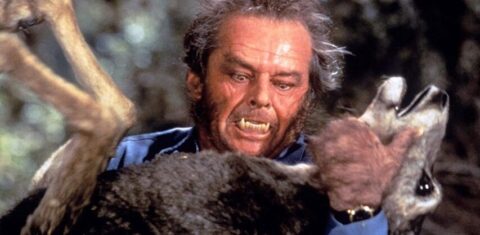
I said in the above synopsis that Will turns into a werewolf, but that word is never actually mentioned, though “demon wolf” is. That’s just one of many unusual things about this rather offbeat lycanthrope [though that word isn’t said either] movie which, while a big hit at the time of its release, was met with a somewhat muted response, especially from horror fans, many of whom were disappointed with the relative shortage of werewolf action in a two-hour movie and the limited makeup effects, though I’ve always really liked it, in part because it tries to get to the roots of the lycanthrope myth, which was based on the question as to whether man really can escape his animal roots, and what happens when they arise. It recalls many elements from The Wolf Man yet introduces some new concepts, most notably the idea of somebody who’s bitten by a werewolf not just becoming one at night, but also experiencing changes in his human form, and changes which are often positive, at least to Will, who not just becomes a bit animalistic but also becomes younger, a rejuvenated person, in what is a wry look at middle aged crisis. You could say that director Mike Nichols isn’t particularly at home with horror, with some scenes coming across as a bit muted, but then Nichols wasn’t trying to make a pure horror film – it’s as much a character piece emphasising psychology and satire – and, while some may disagree, I tend to like it when filmmakers who don’t tend to do this sort of thing dab their fingers in the genre and try to do something different, and, even if you don’t like the result here, you have to admit that it’s pretty interesting, a genuinely offbeat big studio picture. The would-be serious critic in me thinks that the switch to full-on beastie action in the climax is jarring and that the story would have been better with a final act that’s subtle. The werewolf lover in me loves it that we get a fight between two werewolves.
The origins of the project date from 1987 when producer Douglas Wick woke up in the snow after a dream he had; he didn’t remember the dream itself but felt a kind of “lunar energy”. Wick was trying to set up Working Girl with Nichols at the time, and Harrison Ford was keen on doing a western with author Jim Harrison. That fell though, but Harrison wrote a screenplay taking Wicks’ dream as a starting point, based on the question: how does the civilised man live in harmony with his Neanderthal self, and what if the Neanderthal self was awakened? Sony keenly set up the project, and Nicholson instantly came on board having worked with Nichols before, but it was felt that Harrison’s script was too much like a novel with a lot of “interior” material, so Wesley Strick did several rewrites, changing the lead character from a lawyer into a book publisher, and Nichols’s partner Elaine May did some uncredited work on the dialogue. There was much to-ing and fro-ing as to whether Laura was the daughter of Raymond or this brother, and some tension on set between Nichols and Nicholson because the latter was now a much bigger name than the former. When Baker accidentally used spirit gum to stick his fake hairs on, something which Nicholson said he was allergic to, Nicholson came on set the next day with boils all over his face, while, when filming the climax, a stunt man knocked himself out on some steps when propelled through the air without protection. While an early draft had a transformed Will being kept on a secluded property with Laura making periodic visits via helicopter, rumours that both the climax and the final scene were heavily altered are false; in fact only some new shots and re-editing was done, despite there being a six-month delay. Wolf got a spotty response from the critics.
The titles take place over a very long shot of a distant car driving along a road surrounded by snow, the camera still until it moves left to await the car as it drives into the foreground. The car hits a rather stationery wolf and the driver Will gets out to check and is bitten on the arm for his troubles, the reviving animal sprinting off to then turn around to watch him. Will is a put-upon fellow who tells his wife Charlotte that to get a deal at work, he “Did it the old -fashioned way, I begged”. Due to the ruthless Raymond taking over, there’s about to be big changes at work with lots of job losses on the horizon, though everyone feels obliged to go to a big party being held by Raymond anyway. Will’s colleagues say they’ll stick with him, as does his protege Stewart – only that Stewart is actually the one chosen by Raymond to take Will’s job, though Raymond smugly tells Will that he’ll be perfect for Eastern Europe, while Stewart pretends that he didn’t want this. Will accepts the changes, but then seems to scare a horse, after which he sleeps for twenty hours and wakes up a somewhat different person. He can smell what people had to drink, he can hear what everyone’s saying, he regains his sex drive, and he no longer needs his glasses to read. He feels twenty years younger. David Powers in The Lost Boys told us that, actually, it’s fun being a vampire, and it seems to be the same here with being a werewolf. Okay, when you go out at night you forget what you did, but we’ve all been there, and anyway if you’re a good person you won’t cause any harm except to animals and bad people who attack you. As Dr. Vijay Alezais tells him, “The demon wolf is not evil, unless the man that’s bitten is evil”, which is a nice twist. He also tells him that he’ll become a full wolf eventually, but that an amulet will hold this at bay. However, the elderly Vijay wants to become a werewolf so he’ll live for longer, but cannot persuade Will to bite him. The single scene between the two is very long, but Vijay, well played by Om Puri in excellent makeup, is a poignant character.
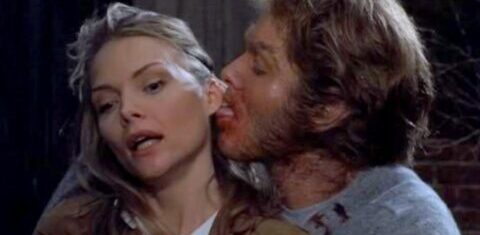
One night Will hunts down, kills and eats a deer. On another he breaks into the local zoo, steals handcuffs from a policeman and bites the fingers off a mugger. While we do see Will find the fingers in his possession the next day with, obviously, no recollection of how they got there, we don’t see the biting. Wolf is quite subtle, too subtle for some. Will in werewolf form looks rather like Henry Hull’s in Werewolf Of London though without the widow’s peak. Seeing as Nicholson looks somewhat wolfish anyway, this kind of works for this particular movie, even if it’s rather minimalist and understandably disappointed a lot of horror fans after the astounding, astonishing work that makeup man Rick Baker did for An American Werewolf In London, the main transformation sequence being a scene which has yet to be beaten in these days of CGI running supreme. Here, we don’t even get to see a full change, though when the part-transformation that we do get comes along, the film has become quite different to how it was. I’m not going to be snobbish and say that its final third is of a lower level, even though Baker says that he’s also of this opinion on the documentary on Indicator’s Blu-ray, but it’s very different and the plotting a bit haphazard, even if the decision to keep things relatively small-scale, even intimate, is praiseworthy. There’s a murder of a fairly major character, another major character who’s now a werewolf, and that lycanthrope battle which is okay though weakened a bit by excessive use of slow motion which Nichols also uses elsewhere and to no positive effect. Perhaps the coolest effect has Will’s ears move in the office.
The trailer, back in the good old days when trailers were allowed to be inventive and not even contain much film footage, suggested some real eroticism, the only shot being Will looming over a sleeping negligee-clad Laura. However, we don’t get much sexiness at all, despite the potential of Will handcuffing himself to a radiator so he doesn’t cause any harm at night, Laura finding him, then untying him only to handcuff both his hands together behind his back – after which the scene fades out even though the two clearly have sex. Of course if Nicholson and Pfeiffer had had some great chemistry together that might have been enough, but they don’t. When they first meet, he says to her You’re perfectly safe, I’m married” .“And that makes you perfectly safe”? is the reply. When Will tells him things that would send most women running, Laura says to him “maybe you should just accept it”. But we fail to get a sense of a great love that quickly flourishes, with the result that Will’s declaration of deep love to her falls flat – we don’t feel the emotion. Yet Wolf still often works best when it’s not trying to be a horror movie. When Will finally sticks up for himself in the boardroom, peaking in a simply wonderful moment when he pisses on Raymond’s expensive shoes with the words “I’m just marking my territory”, it’s really invigorating. There’s no doubt, from watching the film, that Nichols, the director of character-led pieces in a realistic mileau as varied as The Graduate, Carnal Knowledge and Silkwood [oh, and the hugely underrated if rather bonkers Catch 22], was most interested in the action in the boardroom, and where dialogue is key; some of the publishing company scenes positively sizzle with witty, barbed chat. Nicholson is very restrained throughout even though you’d expect him to go over the top. At one point he delivers a lecture on cultural decline in a time where “Taste and originality are something of a handicap”. There are times when I agree.
This is the thing; Wolf doesn’t quite work overall but is full of fascinating elements which suggest that a lot of artists were genuinely passionate about the project and what they knew they could bring to the table. The decision seems to have been made early on to film almost entirely on sets; therefore art director Tom Duffield fills our eyes with design work that give us a sense of the somewhat decedent, empty rich, while the main publishing company set has staircases coming up all over the place in an almost surreal manner. Cinematographer Guiseppe Rotunno ensures that our eyes are seduced by well composed images, most notably the several bits that present a moon then frame Nicholson against it in several different environments. And then there’s the musical contribution of the god that is Ennio Morricone. While he gives us loads of orchestral colour and evocative musical representation of many scenes, he emphasises the tragedy of the tale with a theme for Will which is mournful even when in dramatic form, and accompanies the final scenes with romantic promise. Said final scenes can almost be said to sum up the whole film. They don’t entirely come off, it actually looking as if some shots are missing, yet the concept is great. Wolf still manages to resonate.





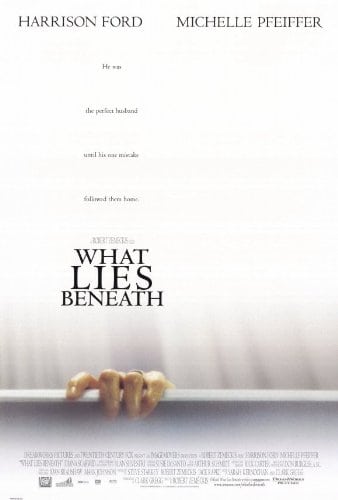
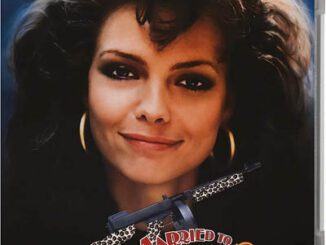
Be the first to comment